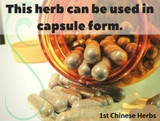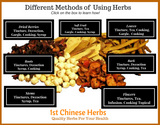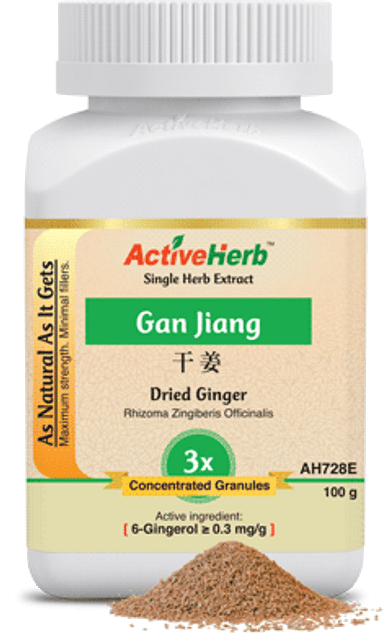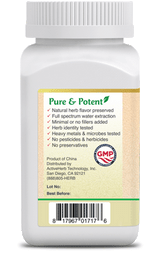Nourish The Body With Herbs And Teas. Herbal Information on Anemarrhena Rhizome Herb in Extract Granule Form
Zhi Mu, also known as Anemarrhena Rhizome, is a herb commonly used in Traditional Chinese Medicine (TCM). It has a bitter and sweet taste and is associated with the Lung, Stomach, and Kidney meridians in TCM theory. Here's how it's typically used:
-
Form: Zhi Mu is often used in the form of concentrated granules, which are extracts derived from the herb.
-
Dosage: The dosage of concentrated granules can vary depending on the individual and the specific condition being treated. It's best to consult with a licensed TCM practitioner for proper dosage instructions tailored to your needs.
-
Administration: Concentrated granules are typically dissolved in warm water and consumed as a tea. They can also be mixed with other herbs in a formula prescribed by a TCM practitioner.
-
When to Use: Zhi Mu is commonly used in TCM to clear heat and nourish yin. It is often prescribed for conditions such as fever, thirst, irritability, night sweats, dry mouth and throat, hot flashes, and other symptoms associated with heat or yin deficiency in the body.
How Is Zhi Mu Grown?
Botanical Characteristics: Zhi Mu is derived from the rhizome of the Anemarrhena asphodeloides plant, which is native to China, Korea, and Mongolia. It belongs to the family Asparagaceae. The plant typically grows in dry, sandy soil and features long, lance-shaped leaves and small, white flowers. The rhizome, which is the part used in herbal medicine, is harvested in the autumn and then dried for medicinal purposes.
Cautions:
-
- Pregnancy and Breastfeeding: Zhi Mu should be used with caution during pregnancy and breastfeeding. It's best to consult with a healthcare professional before using it in these situations.
- Yin Deficiency with Cold: While Zhi Mu is generally used for conditions of heat or yin deficiency, it should be avoided in cases of yin deficiency with cold symptoms, as it may exacerbate the condition.
- Drug Interactions: Zhi Mu may interact with certain medications. If you're taking any medications or have any underlying health conditions.
- Deficiency of the spleen and stomach.
Common Name: American Dragon, Know Mother Root
Botanical Name: Anemarrhena asphodeloides rhizome
Product Properties: Bitter, Cold
Other Names: Know Mother Root
Pin Yin Name: Zhi Mu
Package Size: 100 grams
Origin: China
Brand: Active Herb
Do not use if pregnant or nursing. Deficiency of the spleen and stomach.
Naturally Occurring Components: Saponin, Choline, Tannin
Summary of Zhi Mu
- Zhi Mu nourishes Yin
- Reduces fire
- Moistens dryness
- Lubricates the intestine.
- The Anemarrhena plant is a member of the lily family and is cultivated in China as a decorative plant.
- The roots are collected and dried for medicinal purposes.
- Traditionally the zhi mu is use for respiratory concerns, to promote oral health and to ease low back pain.
- Clear heat
- Nourish yin
Single herb granules are dry authentic herbs and are free of sulphur, herbicides and pesticides.
What Herbs Combine with Anemarrhena Rhizome?
- Huai Niu Xi and Anemarrhena Rhizome
- Shi Chang Pu and Anemarrhena Rhizome
- Amber and Anemarrhena Rhizome
- Goji Berry and Anemarrhena Rhizome
- Nut Grass and Anemarrhena Rhizome
- Patchouli and Anemarrhena Rhizome
- Burdock and Anemarrhena Rhizome
- Astrgalus and Anemarrhena Rhizome
- Balloon Flower and Anemarrhena Rhizome
Check out our How to Use Bulk Herbs page to see how to use herbs correctly. Our web page is constantly expanding, as of today we have articles on:
- How to make salves, poultice, tinctures, teas, capsules, gargles, and foot bathes
- How to make a citrus facial splash
- Cayenne pepper: Caterpillar and aphid spray ( Natural insect repellent )
- Citrus potpourri basket
Traditional Chinese Herbs
Chinese Traditional herbs should be regarded as an added feature to modern western healthcare, and not as a replacement. Chinese traditional herbs (Teas) emphasize harmony, and balance.
Reference:
https://asante-academy.com/encyclopedia/zhi-mu/
https://pubmed.ncbi.nlm.nih.gov/2473929/
https://herbpathy.com/Uses-and-Benefits-of-Zhi-Mu-Cid3074
https://www.americandragon.com/Individualherbsupdate/ZhiMu.html
https://www.sciencedirect.com/topics/pharmacology-toxicology-and-pharmaceutical-science/anemarrhena























